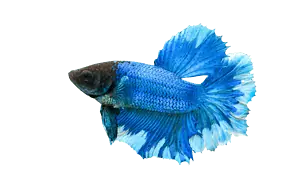Do you have a container of expired fish food and wonder if it’s still good? How vital are expiration dates on fish food, anyway?
How can you keep your fish food fresh and nutritious for as long as possible?
Fish food packaging comes with a use-by date and a batch number. After this date, fish food loses nutrients and risks going bad. Stretching dried foods past their expiry date is possible, but you need to be cautious if food shows signs of spoilage, bacteria, or mold.
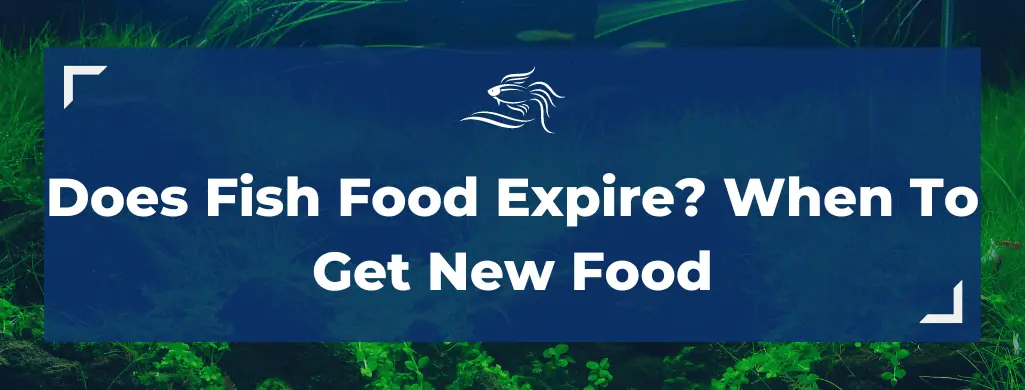
Table of Contents
A Handy Table of Fish Food Expirations
| Food Type | Expiration Time after opening |
|---|---|
| Pellets | 6 months |
| Flakes | 6 months |
| Crisps | 1 year |
| Frozen food | 3 months in freezer |
| Freeze-dried food | 15 – 20 years as long as it remains dry |
| Live foods | As long as they are alive |
How Long Does Fish Food Last?
Regardless of what type of packets of fish food you buy, always check the expiration date. You do not want to buy nearly expired food!
If you follow the manufacturer’s storage instructions, you will extend the life of your fish food. Using a scoop instead of your fingers will keep the food free from oils and bacteria.
Dry fish food is in widespread use for good reason. Dried food products last a long time, from 18 months to 3 years.
In well-sealed fish food containers in optimal storage conditions, dried foods can last longer than their stated shelf life by up to 3 months. They are also less expensive than other foods.
Fish Flakes
Fish food manufacturers make fish flakes out of fish meal, squid meal, shrimp meal, earthworms, spirulina, and vitamins and minerals.
Manufacturers dehydrate flake foods to 10% of their original weight.
Flakes are then sealed airtight in a container with foil. Opening this foil exposes the food to oxygen and moisture. This makes the food spoil.
The fish flakes have a larger surface area to be exposed to, so oxidation and moisture affect them rapidly. They lose vitamin C faster than other types of food.
Add vitamin C back in with vitamin C tablets and garlic extract to make older fish food tastier for your fish.
Fish Crisps
Fish crisps are basically what they sound like, a crispy, dense version of the same ingredients in flake foods.
Crisps keep nutrients longer than flakes and store better because they have less surface area exposed to air and moisture content.
You’ll pay a little extra for crisps, but they are cleaner for your tank. Like flakes, they will last up to 2 to 3 years in a sealed container, 1 year after opening.
Fish Pellets
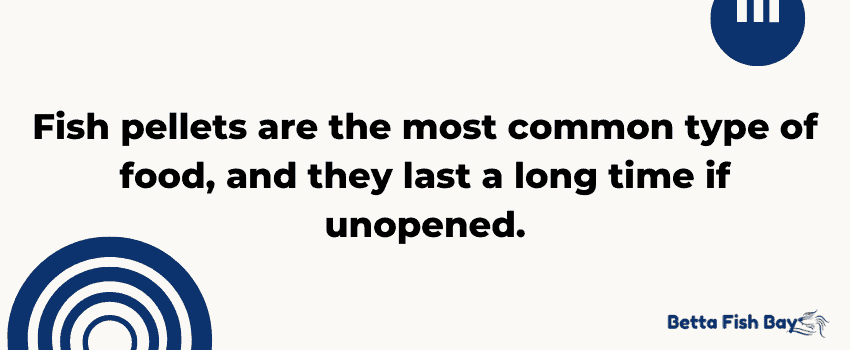
Fish pellets last a little longer than flakes. Stored in airtight, light-proof resealable pouches, they will last up to 3 years unopened.
Once open, they will absorb oxygen and moisture more slowly than flake foods because of their shape and size, but they still only last about 6 months.
I’m not saying you don’t need to worry about storing them safely, your fish will still get sick from eating deteriorated fish pellets if they aren’t stored properly.
Storing fish pellets properly depends on the size of the pellet and the ingredients in them, such as preservatives.
Like flake food, they usually make pellets out of fish meal, shrimp meal, spirulina, plant proteins, vitamins, and minerals, but also include a binding agent, such as wheat.
Fish pellets often contain fillers such as soy or corn which can go rancid quickly.
Stick-on tablets
Stick-on tablets stay on the side of the tank to feed your fish. They stay fresh for a long time in their packaging. Always check the expiration date on the container, as with other foods.
Wafers
Algae for bottom feeders come in wafers in resealable pouches to keep them fresh for a long time.
Freeze-Dried Fish Food
Freeze-drying food is the best way to go as far as longevity.
Supplemental foods such as the following can last from 15-20 years:
- Daphnia
- Garlic extract
- wheat germ
- Brine shrimp
- Bloodworms
- Saki
- Krill
- Tubifex worms
The process of freeze-drying extracts 98% of the moisture from the food, which makes it last nearly indefinitely in an airtight, sealed container.
Freeze-dried foods go a long way, as you only feed a little of them to your fish to supplement their regular food.
Fresh Fish Food
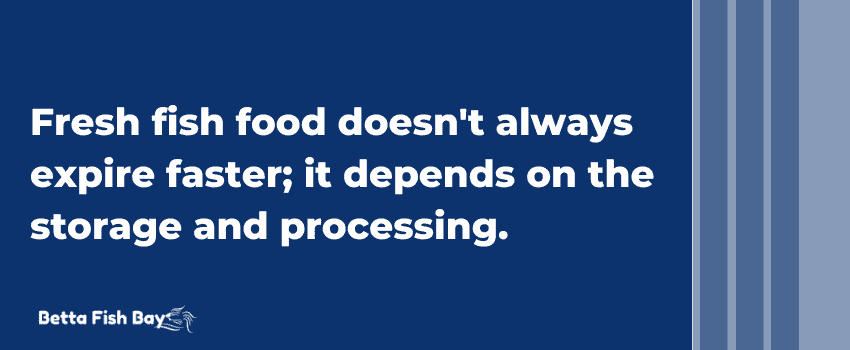
Types of fresh fish foods include:
- Earthworms
- sludge worms
- Water fleas
- Bloodworms
- Mosquito larvae
- Brine shrimp
- Protozoa
- Microworms
- Feeder fish
The biggest risk to your fish from live foods is they may introduce diseases into your fish tank. Always buy from a reputable seller.
Fresh foods more closely resemble your fish’s natural diet but do not store well.
Frozen Fish Foods
If you are able to feed it to your fish live, you are able to freeze it. Most frozen food is a single organism frozen into cubes.
Keep it fresh by storing properly in sealed containers in your freezer to reduce the risk of freezer burn. Do not thaw and then refreeze.
Fresh Foods Such As Produce
Fish also eat fresh produce. Some fish enjoy squished peas, such as catfish, platys, and swordtails. Many fish also like sliced squash.
Remember to remove uneaten food from the tank after a few hours. As with other human foods, fresh produce needs to be refrigerated unless served right away.
What Does the Expiration Date of Fish Food Mean?
The expiration date of fish food is a “best used by” guideline for freshness and nutrition. Over time, even freeze-dried food loses nutrients.
It is best to use dried food within 6 months of opening the container.
Using supplemental foods such as live foods or frozen foods when you are using foods close to the expiration date will help your pets get all the nutrition they need for good health.
Remember, as soon as you open your fish food container, oxygen, and moisture degrade it. It loses vitamin C. After a period of time, it becomes the equivalent of junk food, nutritionally.
Your food may become soggy, smelly, or infested with insects. If any of these things happen, it’s gone bad. Throw it out.
As a general rule, replace your fish’s food periodically, such as every 6 months.
Is It Safe to Use Recently Expired Food?
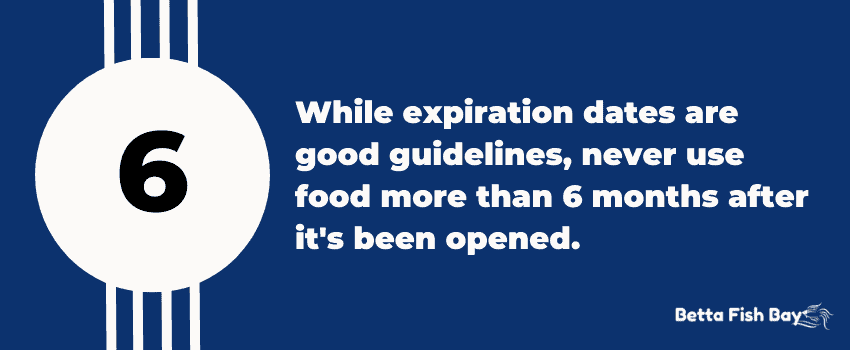
Whether you want to feed your fish recently expired food is a toss-up.
If you are the one who purchased the food, it looks and smells alright, and it has just expired, it is probably fine to use for a feeding or two until you get new food.
Long-term use of expired food can lead to nutritional deficiencies and possibly disease for your fish.
Will Expired Food Make Fish Sick?
Your fish needs optimal nutrition to maintain its health. A healthy fish is disease resistant.
By feeding your fish expired fish food, you are opening up your pet to various illnesses, digestive problems, infections, and diseases from bacteria and contaminants.
Fish food poisoning is also a concern. Watching your fish for unusual behavior is vital for monitoring its health. You do not want your pet to become ill from its food!
A sick fish may:
- Have a low appetite
- Be bloated
- Be constipated
- Be weak
- Lose its balance or buoyance (it may float upside down or just sit there on the fish tank floor)
- Swim oddly, spiraling, and shimmying
- Isolate itself
- Hang out at the surface and look like it is gasping for air
- Breathe more quickly than normal
- Scratch or scrape their body against objects and ‘flash’ their belly
- Hold its fins tightly against its body
Steps to take to extend the shelf life of fish food
Follow these tips to prevent your fish food from spoiling, so you provide your pet with the best diet possible.
- Keep food in a cool, dry, dark environment (away from sunlight, high temperatures, and humidity, which all start food to decay)
- Do not touch the food with your bare fingers, as it will transfer oil and bacteria
- Use an airtight container and keep it sealed when not in use
- Do not mix foods from different containers together
- Check expiration dates and use the food within the stated timeframe
- Add garlic extract to homemade foods to extend their shelf life
Buying Fish Food in Bulk vs. Small Quantities
If you only have a few fish, do not buy food in bulk. You will keep your food fresher by purchasing it in smaller quantities more frequently.
Pay attention to how much food you are using and buy the appropriate size for the shelf life of the food. This will help you save money and reduce food waste.
Get the Most Out of Your Fish Food!
Always check the expiration date and properly store food to keep your fish healthy.
Opened food starts to degrade immediately and should be discarded after 6 months or if it shows signs of decay.
Store food in resealable containers such as opaque jars. Protect food from oxygen, moisture, direct light, and high temperatures.
Do not use thin plastic bags or non-resealable food packets.
Find out more about the best food for bettas in our article here.

